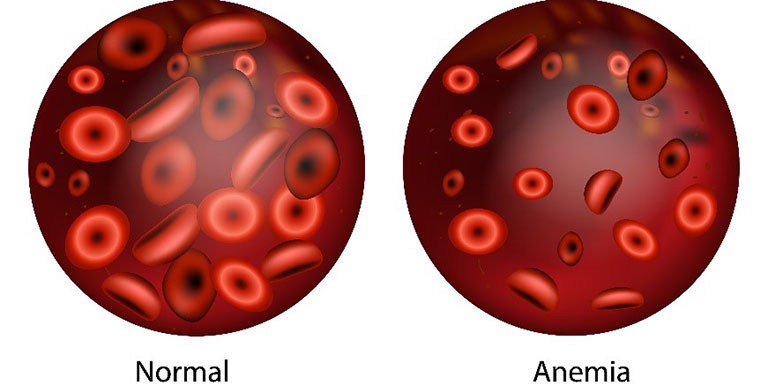Anemia is a condition characterized by a low red blood cell count or a low hemoglobin level in the blood. It can cause weakness, fatigue, shortness of breath, and other symptoms. Kidney disease can be a contributing factor to anemia, and it’s crucial to understand how this happens and what you can do to manage it. In this blog, we will discuss the link between kidney disease and anemia and provide information on how Southwest Kidney Institute can help.

How Kidney Disease Causes Anemia
The kidneys play a vital role in producing erythropoietin (EPO), a hormone that stimulates the bone marrow to produce red blood cells. When kidney function declines, the production of EPO decreases, leading to a decrease in the number of red blood cells. This results in anemia.
In addition to decreased EPO production, kidney disease can cause other factors that contribute to anemia, including:
- Blood Loss: Kidney disease can cause blood loss in the urine (hematuria) or through the gastrointestinal tract (GI bleeding), which can lead to a decrease in red blood cells.
- Iron Deficiency: The kidneys play a role in regulating iron levels in the body. When kidney function declines, the body may not absorb enough iron, leading to iron deficiency anemia.
- Inflammation: Kidney disease can cause inflammation, which can interfere with the production of red blood cells and contribute to anemia.
- Dialysis: Patients with advanced kidney disease may require dialysis, which can cause blood loss and decrease red blood cell production.
How Anemia Affects Kidney Disease Patients
Anemia can have a significant impact on the quality of life of patients with kidney disease. Some of the common symptoms of anemia include fatigue, weakness, shortness of breath, dizziness, and cognitive impairment. These symptoms can interfere with daily activities and decrease the ability to perform physical activities, leading to a decreased quality of life.
Furthermore, anemia can have adverse effects on the cardiovascular system. A low red blood cell count can cause the heart to work harder to pump blood, leading to an increased risk of heart failure and other cardiovascular diseases. Anemia can also increase the risk of hospitalization and death in patients with kidney disease.
Treatment Options for Anemia in Kidney Disease Patients
The treatment of anemia in kidney disease patients depends on the underlying cause of the anemia. Some treatment options include:
- Erythropoietin-stimulating agents (ESAs): ESAs are synthetic versions of EPO and can be given to stimulate the production of red blood cells. They are administered through injections or intravenous infusion.
- Iron supplements: Iron supplements may be prescribed to treat iron deficiency anemia.
- Blood transfusions: In severe cases of anemia, blood transfusions may be required to replace the lost red blood cells.
- Dialysis: In patients who require dialysis, adjustments can be made to the dialysis treatment to minimize blood loss.
- Nutritional support: Nutritional support can help improve the absorption of iron and other nutrients that are important for red blood cell production.

How Southwest Kidney Institute Can Help
At Southwest Kidney Institute, we understand the challenges that kidney disease patients face, including anemia. Our team of experienced nephrologists, nurses, and support staff works together to provide comprehensive care that addresses the unique needs of each patient.
We offer a range of services, including dialysis, transplant evaluation and management, clinical research, and patient education. Our goal is to help patients manage their kidney disease and associated conditions, including anemia, so they can live healthier, more fulfilling life.
If you are experiencing symptoms of anemia or have been diagnosed with kidney disease, it is essential to seek medical attention. Our team at Southwest Kidney Institute can provide a thorough evaluation and develop a personalized treatment plan to manage your condition.
We also offer educational resources to help patients understand their condition and how to manage it. We believe that knowledge is power, and we want our patients to feel empowered to take an active role in their healthcare.
In addition to medical treatment, lifestyle changes can also help manage anemia in kidney disease patients. These lifestyle changes include:
- A healthy diet: A diet rich in iron, vitamin B12, and folic acid can help support red blood cell production.
- Regular exercise: Regular physical activity can help increase energy levels and improve overall health.
- Stress management: Stress can worsen anemia symptoms. By practicing stress management techniques, like yoga or meditation, one can reduce stress levels.
- Smoking cessation: Smoking can worsen anemia symptoms and increase the risk of cardiovascular disease. By quitting smoking, overall health can be improved.
In conclusion, anemia is a common complication of kidney disease that can significantly impact the quality of life of patients. Understanding the link between kidney disease and anemia and seeking appropriate medical care is crucial for managing this condition. At Southwest Kidney Institute, we are committed to providing compassionate, comprehensive care to help patients manage their kidney disease and associated conditions, including anemia. To schedule an appointment with us, please visit – https://swkidney.com/contact-us/ OR Contact Us – at 480.610.6100

